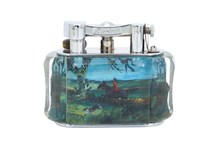From March 1, traders who do not wish to register officially with Customs & Excise will no longer be able to legally accept cash payments of €15,000 (just over £10,000) or more.
The Money Laundering Regulations 2003 – part of the new Proceeds of Crime Act – effectively extend the scope of established laws aimed at the ‘regulated sector’ (primarily firms in the financial sector) to include other businesses such as estate agents and the art and antiques trade.
The laws require immediate action from auctioneers and dealers who wish to accept cash payments of €15,000 or more.
Those who do will need to register with Customs before April 1 as a so-called High Value Dealer and have in place procedures to combat money laundering. Tax evasion – undoubtedly a difficult area for the art market – also comes under the umbrella of the new regulations.
In practice, however, the trade bodies do not anticipate large numbers of the UK’s art and antique dealers registering as HVDs. Instead, LAPADA and the BADA are pushing the message that now dealers will no longer be able to accept large cash payments.
The trade bodies have asked Customs to produce some official literature that dealers could display in their shops or give to clients so as not to cause offence when refusing cash payments of €15,000 and above.
Those who do choose to register will find they already carry out some of the rules of due diligence, such as a five-year record-keeping system, as part of their obligations as members of BADA and LAPADA members.
More controversial, however, is the need to check the identity of cash-paying clients before engaging in a business relationship; dealers must also report any knowledge or even suspicion of money laundering or tax evasion.
Further requirements include the appointment of a member of staff to act as anti-money laundering officer to liaise with the National Criminal Intelligence Service and the training of staff to recognise suspicious transactions.
“The new regulations will force the art market to reconsider its long-standing tradition of confidentiality in client relations,” says Pierre Valentin, head of the Art and Cultural Assets Group at City law firm Withers. He spoke on the subject at a seminar organised by the Department of Culture Media and Sport at the British Museum in January.
“The obligation to report is pretty draconian. It won’t matter whether the person they suspect is a client or not. If they suspect a competitor, or someone who walks into their shop but does not buy, they will have to make a report. The test is not just whether the dealer knew or suspected money laundering, but whether there were reasonable grounds for him/her to know or suspect.”
Breaching the new law could result in two years in jail. Such serious penalties have prompted fears that every single suspicion, no matter how minor, might be reported in business sectors which are largely unprepared for the impact of the new rules.
Dirty money laws – what you need to know
THE new money laundering regulations come into force next month, creating new legal requirements for auctioneers and dealers who wish to accept large cash payments from their clients.




